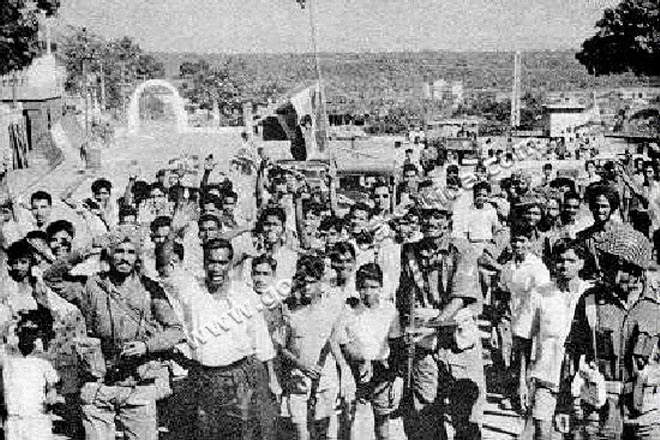A quick glance gives more than a hint that New Delhi was equally looking with (more than) one eye at the global response over Goa

Just when we thought we knew enough about Goa and 1961, along comes a huge can of worms, which promises to raise questions, make us rethink what we were taught in high school, and wonder why we know so little about an event that reshaped our lives in our generation itself, and reopened old issues.
As most would by now know, the returning President of the United States, maverick Donald Trump, gave in a directive on March 17, 2025, stating that "all records previously withheld for classification" that are part of the President John F Kennedy Assassination Records Collection be released.
President Kennedy (1917-1963) was President of the US of A from Jan 20, 1961 to Nov 22, 1963, when he was assassinated.
This makes his period in office crucial for understanding some little noticed facts relating to Goa, and December 1961. This was the crucial month in which the trajectory of Goa took a change forever. For better, or worse, or without any significant change -- it depends on your politics, and understanding of things.
Some of the 1961 documents might have been available even earlier, while a few are getting declassified now. Not being a historian, this columnist could only do a quick and hurried journalistic appraisal of what's coming out via the National Archives of the United States. See https://www.archives.gov/research/jfk/release-2025
Maybe our historians will -- or should -- take a closer look at what exactly the two-generation old records are telling us today. On first seeing this, one was tempted to comment: "Read in between the lines." This was on encountering a tightly-packed eight-page typewritten letter from Pandit Nehru to JFK, dated December 29, 1961.
A friend from the US shot back: "..I just finished reading the letter and found it fascinating and informative. I'm curious about your comment suggesting we 'read in between the lines.' Can you perhaps write a little about what some of us might be missing, especially those of us not born here, but have adopted Goa as our home?"
A look at another sent by Weil to Talbot was also rather insightful. T. Eliot Weil, Director of the Office of South Asian Affairs, wrote this to Phillips Talbot, the Assistant Secretary of State for Near Eastern and South Asian Affairs in early December 1961.
According to a US Embassy telegram (of Dec 5, 1961), the "mounting pressure" on the GoI to take "positive steps" to incorporate the sub-continental "remaining Portuguese Overseas Territories" into India, following those already "given up" by the British and the French.
Weil saw the "pressure on the Government of India" coming from three sources (b) "Goan 'nationalists' resident in India, especially in Bombay...(b) African nationalists, generally, and Angolans particularly, who have been questioning India's professed anti-colonialism....(c) The opposition parties in India, who are attacking the Government of India for a weak foreign policy in relation to Chinese Communist occupation of Indian-claimed territory in Ladakh, and the do-nothing policy in Goa".
Also, Weil went on to suggest that Indian Defence Minister Krishna Menon "now running for Parliament" was likely feeling "all the above pressures keenly". This issue, of Krishna Menon's electoral compulsions, was discussed in the 2023 book by the late Valmiki Faleiro, titled 'Goa, 1961'.
The US perspective said that a "widespread press campaign" was underway in India for government action on the "Goan issue". Incidents off the island of Anjidiv were widely publicised, it was stated.
In the earlier letter, Nehru writes: "Various legal and constitutional issues have been raised in criticism of our action. We do not think that that particular criticism is justified. I say so after giving a good deal of thought to this matter."
He goes on to add: "But one criticism has, I think, some justification. This is that any action that we took, even though otherwise justified, was likely to have consequences in other fields which would be undesirable."
Nehru put forwards many arguments: being left with no choice in the matter. Choosing the lesser evil. That the action in Goa was welcome by practically every group and Party in India and "even more so by the common man".
That the Portuguese and French stayed on in India due to "British power which dominated over India as a whole", and could not stay on without it. Besides Portugal's provocation and "incomprehensible" policy, Nehru said Goa "continued to be a place where there was not the slightest freedom or civil liberty". Nehru mentions the "number of incidents" that happened in Goa. He tells Kennedy that the Portuguese "had decided to destroy important installations, institutes and buildings in Goa. This lent a certain urgency to the question of our taking action."
Nehru tells Kennedy that in the 26-hour-action, the Portuguese Government had "no strength or will left". He says there were "very large quantities of military equipment, arms and dynamite. But there was hardly any fighting" and the swift action, in his view, averted the wider use of dynamite.
He cites the approval of the Cardinal Archbishop of Bombay, and also some other dignitaries of the Catholic Church in Goa. Nehru writes: "Sometimes, a distinction is made in the Press and elsewhere the Christians and non-Christian inhabitants of Goa. This distinction has very little substance in so far as this matter is concerned."
A quick glance gives more than a hint that New Delhi was equally looking with (more than) one eye at the global response over Goa. The developments of 1961 had as much to do with global geo-politics, and its fallout, as with a decision on just the fate of Goa itself.